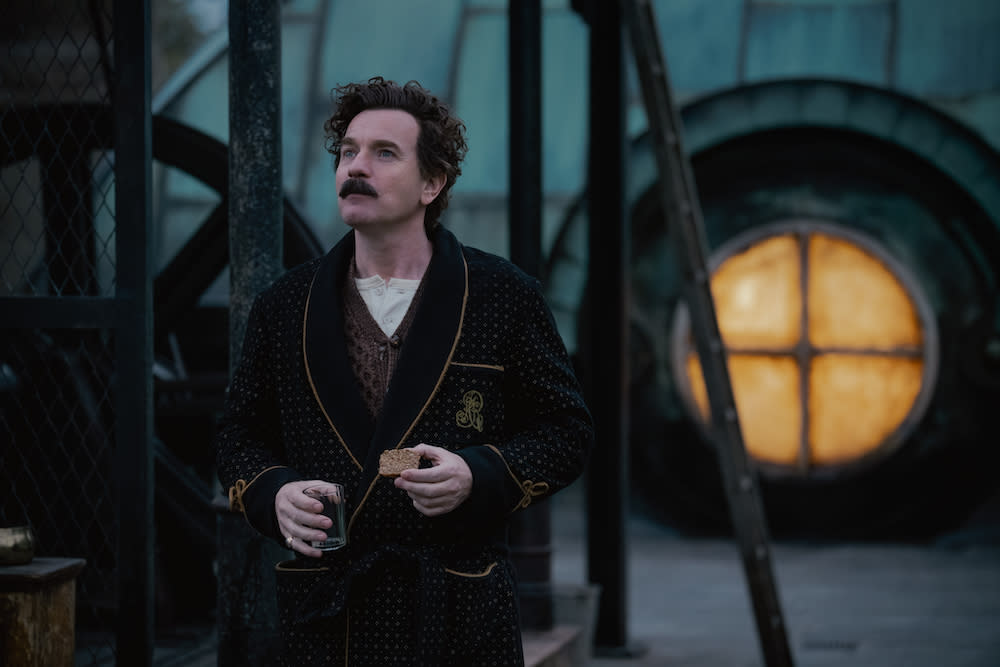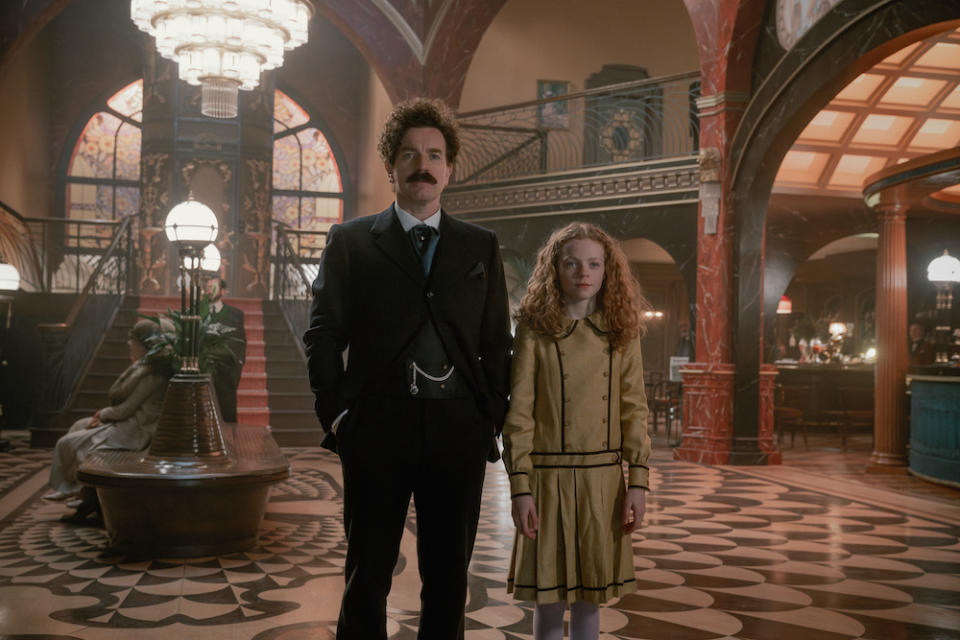‘A Gentleman in Moscow’ Review: A Splendid Ewan McGregor Finds the Silver Lining in Societal Collapse

Ewan McGregor is no stranger to accents. The Scottish star earned an Emmy nomination for playing Minnesotan twins on “Fargo,” won TV’s highest honor for embodying the Iowa-born, Manhatten-bred Halston (in Ryan Murphy’s “Halston”), and should have an Oscar on his shelf for belting out impeccable love ballads as Christian, the smitten English author in “Moulin Rouge!” He’s channeled a stock American accent enough times for U.S. audiences to forget his natural intonation and tweaked his rounded enunciation to befit everything from salmon to sea otters.
So when tasked with playing Count Alexander Ilyich Rostov in Showtime’s eight-episode adaptation of “A Gentleman in Moscow,” I have no doubt he could’ve channeled a perfectly feasible Russian accent — and I am profusely thankful he didn’t. The series, which starts in 1917 and spans the decades-long establishment of the Soviet Union, allows McGregor to speak in a polished version of his traditional dialect, providing the prim and proper aristocrat an easygoing decorum that’s about as far from “Trainspotting” as you can get without going full Malkovich on a box of Oreos. He is, after all, the titular gentleman in a story about the importance of good manners — not as a tired ritual to fit in at fancy parties, but as a beacon of honor and kindness at a time when both were sorely lacking.
More from IndieWire
“A Gentleman in Moscow” depicts a collapsing society filled terrified citizens struggling to understand ass-backwards revisionism. Its parallels to modern times are clear enough — whether your mind goes to Russia’s abominable attacks on Ukraine or America’s own amoral assaults on education, bodily autonomy, you name it — yet these issues go largely unremarked upon. This “Gentleman” is persistently apolitical, preferring to highlight humanity’s capacity for compassion rather than point fingers at the invading armies or oppressive political parties who lack it. While an unwillingness to engage more thoroughly can be frustrating, it’s McGregor’s accent, along with the ensemble’s hodgepodge of vaguely European voices and a sheltered vantage point from inside a beautifully adorned hotel, that invites viewers to enjoy a pleasant stay. Ben Vanstone’s adaptation of Amor Towle’s 2016 novel may not be capital-I Important, but it’s effective in its mission to civilize via niceties.
When we first meet Count Alexander, he’s being dragged in front of a tribunal. The October Revolution is underway, and Russian elites (dukes and duchesses, princes and princesses) are being rounded up for banishment. Some are killed, like the man Alexander sees dragged around a corner and shot as the mustachioed Count awaits his own hearing. Luckily, his Bolshevik judges found an old poem authored by Alexander, which speaks to the rebel cause in a way most royals wouldn’t dare. Because of his recorded sympathies for the current cause, his life is spared and Alexander is instead sentenced to live out the remainder of his days at the Hotel Maripol, where he’s been held since the provincial government first took power.
Assigned a diligent watchdog named Osip (Johnny Harris), Alexander is told he’ll be killed if he ever steps foot outside his opulent lodgings. At first, that’s just fine with our Count. Alexander understands what he’s lost (his freedom) and appreciates what he’s been spared (a spot along the firing line), but his unflappable cheeriness during his initial months at the Maripol can also be attributed to a relatively undisturbed routine. He’s grown accustomed to a certain standard of living, and it’s a standard the five-star hotel can continue to meet. Life imprisonment isn’t exactly “hard time” when you can get a professional shave and a haircut every week, dine in a restaurant with white tablecloths and tuxedo-clad servers each night, and mingle with guests from the outside world as they frequent the best nightly residence in all of Moscow.

But those guests have a funny effect on Alexander. Soon, a prince (Paul Ready) he knew from back in the day arrives as hired help. He’s there to play violin for the dinner guests, and he’s already plotting his escape from indentured servitude. Both he and Alexander have been deemed “social parasites,” which is exactly what it sounds like: people who live off the collective work of others. To be fair, they have been. They’re royals. In Lenin-era Russia, such parasites are punished, and some such parasites can’t cope. While the paupered prince feels he has to flee (for his safety or his suffering, it’s not always clear), Count Alexander welcomes his own humbling circumstances (as a punishment for past sins). Then, with a depressive swing here and a mournful period there, he sees beyond his insulated perspective thanks to a steady surge of diverse guests. Huzzah! Growth, even in captivity.
Yet it’s here, in the uncomfortable and culturally partisan understanding of a crown’s value, that “Moscow” struggles a bit, before eventually landing on a broad postition: Everyone is unique, and the privileged among us certainly don’t deserve to die solely for their stature. Sure. OK. We can all (maybe) agree to that. But in a TV landscape filled with justifiably savage satires of the 1 percent, “Gentleman’s” radical kindness can often feel like misplaced sympathy.
Luckily, the cast steers us (sometimes quite strongly) in the right direction. Essential aides along Alexander’s evolution include Anna Urbanova (Mary Elizabeth Winstead), an actress who takes a liking to the curious, curly-haired creature living in her favorite hotel. Then there’s Nina (Alexa Goodall), a fellow captive who moves through the Maripol as if it only has four exterior walls. There’s no room she can’t enter, no secret she can’t divulge, and her friendship with Alexander showcases Victor Molero’s striking production design (an elegant combination of inky yet vivid greens, browns, and reds that pairs nicely with naturalistic spotlighting). An old family friend Mishka (Fehinti Balogun) feels all the more amiable because of McGregor and Balogun’s earnest rapport, while Harris’ Osip makes for a fine Javert stand-in even before the “Les Miserables” inspector gets name-checked.
Winstead and McGregor craft another fine romance together (after both “Fargo” and their real-life marriage in 2022), but “A Gentleman in Moscow” belongs to its Count. With a glint in his eye and spring in his step, McGregor mounts a character-centric charm offensive from the jump, winning us over to Alexander’s perspective before we even really know him. That changes soon enough, and while the Count’s past may not be as shocking as brief flashbacks repeatedly tease, McGregor guides us through even the clichéd beats with complete conviction. So often, it’s just his attentive gaze that holds you rapt; his dogged dedicated to each moment matching Alexander’s unyielding positivity across the years.
McGregor has delivered more great performances in TV than he’s delivered great TV shows (he even made me believe “Obi-Wan Kenobi” could be good, the affable son of a bitch), and the trend continues with “A Gentleman in Moscow.” It’s not solely an actor’s showcase, but its cast is nonetheless in perfect harmony with the show’s simple message. Sometimes, that’s all you need to hear.
Grade: B-
“A Gentleman in Moscow” premieres Friday, March 29 on Paramount+ with Showtime. New episodes will be released via streaming every Friday and air Sundays at 9 p.m. ET on Showtime.
Best of IndieWire
Sign up for Indiewire's Newsletter. For the latest news, follow us on Facebook, Twitter, and Instagram.

 Yahoo News
Yahoo News 
